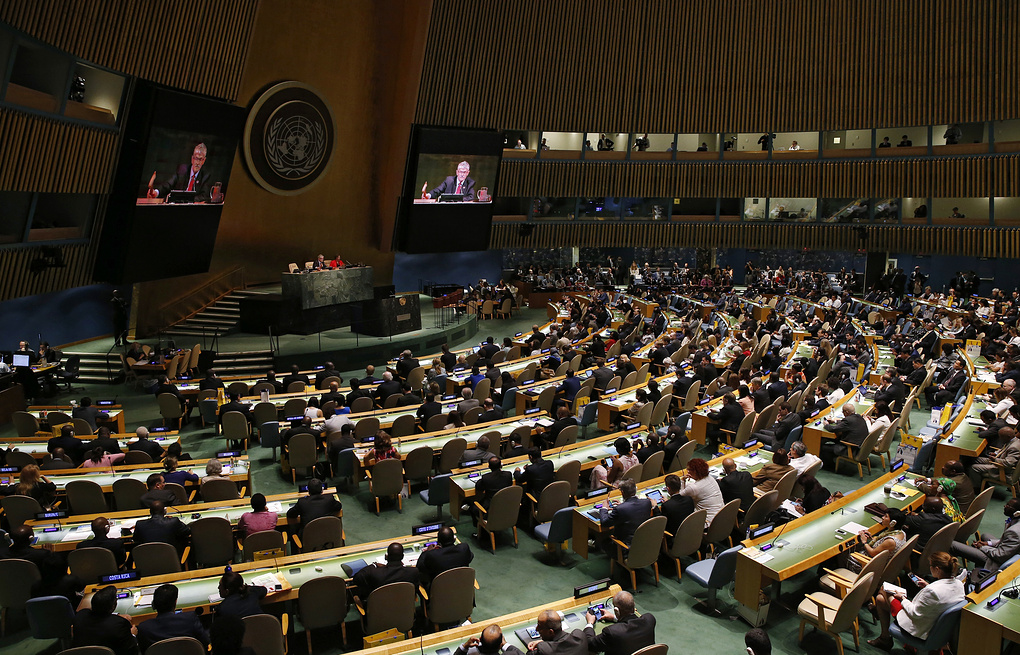On January 1, Kazakhstan concluded its two-year term on the United Nations Security Council as a non-permanent member.
“We have accomplished a lot during these two years,” Kazakhstan’s Permanent Representative to the UN in New York Kairat Umarov said while meeting with the NGO Working Group on the United Nations Security Council in December.
“We are open to dialogue with you and are ready to continue close contacts and partnership on all key issues on the global and regional agenda,” Umarov said according to a report by Egemen.
Kazakhstan was the first Central Asian country to be elected to a two-year term on the Security Council – the high-profile and permanent UN body that investigates international disputes and situations.
Over the last two years, Kazakhstani diplomats assigned to the country’s mission to the UN in New York City focused their efforts on issues prioritized by the country’s president, Nursultan Nazarbayev. Topics covered included countering nuclear proliferation and the use of nuclear weapons and finding political solutions to the conflicts in Afghanistan and Syria. Their efforts have not gone unnoticed by high-ranking officials in Washington, such as the United States Secretary of State.
“Kazakhstan has assumed a key role on the global stage as a partner in ensuring peace and stability, and in promoting economic development and connectivity in Central Asia and beyond,” Mike Pompeo said in a statement issued on the occasion of Kazakhstan’s Independence Day, celebrated on December 16.
Within the span of Kazakhstan’s two-year term on the Security Council, diplomats arranged a working trip to Afghanistan, a country that does not share a border with Kazakhstan but is in close proximity to it. Thanks to their efforts, for the first time in seven years a Security Council delegation visited the landlocked Central Asian country, where the security situation remains perilous.
Kazakhstan has also acted as a mediator for parties to the Syrian conflict. Eleven rounds of meetings have been held in Astana, Kazakhstan’s capital city, since January 2017, which have brought together representatives from the Syrian government, armed opposition groups, and officials from the three guarantor countries of the current ceasefire agreement, namely Iran, Russia and Turkey. By late 2017, the parties to the conflict had agreed to set up de-escalation zones in Syria for six months, although subsequent talks have not yielded much progress.
Eritrea, the northeast African country sanctioned by the UN after being accused of having ties to Al-Shabaab militants in Somalia and refusing to withdraw from border disputes with its neighbor, Djibouti, also received attention during Kazakhstan’s tenure. As a result of multilateral diplomatic efforts at the UN, including Kazakhstan chairing the UN’s Somalia and Eritrea Sanctions Committee, Eritrea and neighboring Ethiopia signed a deal to end a decades-old war and lift 9-year-old sanctions.
“We worked closely with Kazakhstan’s office in New York, and as a result, the sanctions from Eritrea were lifted,” Amanuel Giorgio, the Deputy Permanent Representative at Eritrea’s mission in New York, told 24Khabar. “This is a significant result of Kazakhstan’s activities in the UN Security Council,” Giorgio said.
In addition, Kazakhstan sent troops to Lebanon late last year to support the UN peacekeeping mission stationed there. The rotational deployment includes 120 servicemen who, together with 128 Indian peacekeepers, patrol a UN-drawn border between Israel and Lebanon.
Kazakhstan was elected to a two-year, non-permanent position on the UN Security Council on June 28, 2016. The UN body is comprised of five permanent members (China, France, Russia, the United Kingdom and the United States) and 10 non-permanent members, which are elected in groups of five every year to two-year terms. Non-permanent members do not have veto power over resolutions tabled for a vote, while the permanent five do.







 Armenian sappers commenced on Monday mine-clearance operations in the territories adjacent to the Saint Mary Church in village of Voskepar (Armenia...
Armenian sappers commenced on Monday mine-clearance operations in the territories adjacent to the Saint Mary Church in village of Voskepar (Armenia...
 Russian Foreign Minister Sergei Lavrov has reasserted that Moscow has no intentions to stop the fighting in Ukraine, even if peace talks commence.
Russian Foreign Minister Sergei Lavrov has reasserted that Moscow has no intentions to stop the fighting in Ukraine, even if peace talks commence.
 Iran has refuted reports of alleged damage to Shimon Peres Negev Nuclear Research Centre located southeast of Dimona, Israel, during the recent air...
Iran has refuted reports of alleged damage to Shimon Peres Negev Nuclear Research Centre located southeast of Dimona, Israel, during the recent air...
 Iran’s Foreign Minister, Hossein Amir-Abdollahian, has labeled a foiled Israeli drone attack in certain parts of the country as a "failure" for Isr...
Iran’s Foreign Minister, Hossein Amir-Abdollahian, has labeled a foiled Israeli drone attack in certain parts of the country as a "failure" for Isr...



